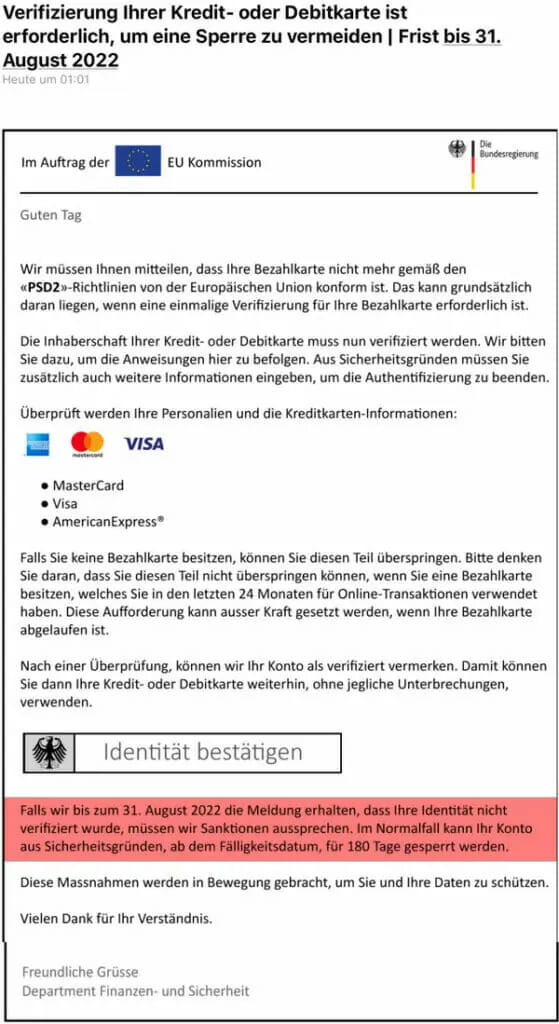Criminals are currently spreading a false email from the federal government with the subject line “ Verification of your credit or debit card is required to avoid a block ,” which the LKA Lower Saxony has already warned . The senders then claim that the recipient's payment card no longer complies with the European Union's PSD2 directive. The credit or debit card must therefore be verified by August 31st, otherwise the account will be blocked.
What is PSD2?
The PSD2 (“Payment Service Directive”) came into force in 2019. Since the end of a transition period, consumers have had to prove their identity using two independent components for many online transactions. In order to approve a payment online, they not only need credit card details and a PIN number, but also have to confirm their identity in a second way - for example via a PIN sent via SMS or via a mobile phone app.
Link leads to a fake federal government website
The police warn against opening the link contained in the email. Anyone who follows the attached “Confirm Identity” link will inevitably end up on a fake website that tries to access data.

Once you have opened the “Confirm Identity” link, a page appears on which personal data should be entered. Anyone who has successfully entered their data will be briefly informed afterwards. After a few seconds, the perpetrators redirect to the real website of the federal government in order to give the appearance of a reputable website. Here the perpetrators misuse, among other things, the logo of the federal government.
What to do if you have fallen into the trap?
If you have already entered your credit card details, you should inform your bank immediately and have the card in question blocked, advises the State Criminal Police Office. This can be done at any time by calling 116 116. Also, file a report with the local police or online watchdog .
Some characteristics that indicate a fraud attempt:
- An impersonal salutation: “Dear Ms./Mr. or customer”
- The text of the email indicates an urgent need for action, such as: “If you do not update your data immediately, it will be irretrievably lost.” Or: “Pay off your debts immediately.”
- Threats are used: “Unfortunately, if you don’t do this, we will have to block your account.”
- You will be asked to enter confidential information such as the PIN for your online banking access or a credit card number.
- The email contains links or forms.
- The email appears to come from a well-known person or organization, but the sender's request seems unusual.
Article image and source: Federal Government
Notes:
1) This content reflects the current state of affairs at the time of publication. The reproduction of individual images, screenshots, embeds or video sequences serves to discuss the topic. 2) Individual contributions were created through the use of machine assistance and were carefully checked by the Mimikama editorial team before publication. ( Reason )

